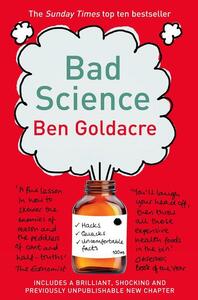Take a photo of a barcode or cover
informative
slow-paced
challenging
informative
slow-paced
thank god for statistics & science & critical thinking but i really wished the author didn't trashtalk humanities majors & jobs & accuse them of wanting to be ""smart"" implying that its value is below the sciences. i could've written it off as a humorous joke the first time it gets said but i alr got tired of it the third time it was mentioned. overall it was a good book - just plz stop it with the stem elitism.
medium-paced
Read if you ever want to understand how science gets so twisted in the media, what homeopathy actually is (besides a scam) and how to correct the lies and misconceptions that we have around health and medicine - though the author dry tone may not be for everyone (but it’s quite amusing if you’re me).
informative
medium-paced
Goldacre is a great writer on the topics of statistics and biomedical science. You don't need a degree to understand the way he simply explains what is often complicated jargon. Hopefully books like this will help improve scientific literacy and aid in developing critical thinking skills.
challenging
informative
reflective
medium-paced
Important read to reframe society's perspective on what science actually is and is not.
For a book published in 2008, it reads as well now as it would have done back then. Perhaps the understanding of some points, like vaccine scares and relative risk, plays an even more crucial role in society now than in 2008.
Although at some points Goldacre seems to get irritated by less important science related issues like 'Brain Gym' (a scheme used in schools based on pseudoscience) and wacky 'science' stories we see in the press to which I'm sure very few give credence.
Nevertheless, the book gives the reader some vital tools in spotting flaws in certain media narratives and other inaccurate claims that we encounter daily.
For a book published in 2008, it reads as well now as it would have done back then. Perhaps the understanding of some points, like vaccine scares and relative risk, plays an even more crucial role in society now than in 2008.
Although at some points Goldacre seems to get irritated by less important science related issues like 'Brain Gym' (a scheme used in schools based on pseudoscience) and wacky 'science' stories we see in the press to which I'm sure very few give credence.
Nevertheless, the book gives the reader some vital tools in spotting flaws in certain media narratives and other inaccurate claims that we encounter daily.




